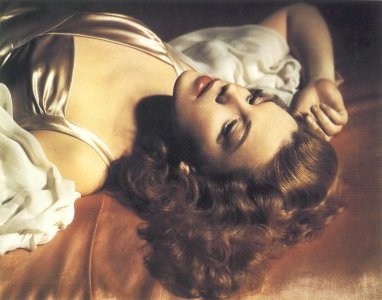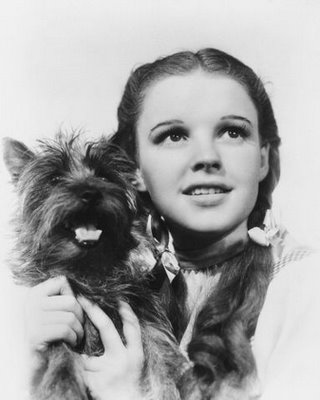 We’ve all heard some version of the story.
We’ve all heard some version of the story.A mother is horrified to find, hidden on the top shelf of her teenage son’s closet, a secret cache not of Playboy magazines but of Barbra Streisand or Judy Garland records.
Porn is one thing. But gay icons? Oh no!
It’s not entirely a gay phenomenon, but for reasons not easily explained, gay men over the last half-century have often been drawn to a certain type of female singer — one with glamour, knock-’em-dead vocalism and a “don’t-(mess)-with-me” world view.
And as difficult as it is to discuss the trend without falling into stereotypes, gay men themselves acknowledge the phenomenon, whether they embrace it or not.
“Gay men have as a goal to discover who they are, to be an individual,” said Heartland Men’s Chorus artistic director Joseph Nadeau, “and they see these people as strong and successful and not willing to take junk from anybody.”
Certain actresses like Joan Crawford held a similar position in the movie world. In the vocal business the phenomenon is more complex — and perhaps more interesting.
Nadeau and the chorus are joined this Saturday and Sunday by actress-singer Cathy Barnett in a concert devoted to the grand dame of gay icons, Judy Garland, whose funeral service on June 27, 1969, coincided with the Stonewall Riots in New York City — a conflagration widely recognized as the beginning of the gay rights movement.
“No Place Like Home: The Songs of Judy Garland” features Barnett “doing” Garland at numerous stages of her career, in multiple costumes and using various vocal styles to represent the “Wizard of Oz” Judy, the “Trolley Song” Judy, the 1960s Judy and so forth.
“Why do gay men love Judy?” wondered Barnett, who said she has sometimes thought of herself as a “gay man living inside a heterosexual woman’s body.”
“Everybody has their own story and their own reason. Most of the stories go that … she loved the boy next door but she couldn’t have the boy next door. She had the beautiful voice and the heart of gold, but she wasn’t the prettiest girl in the room.”
But Barnett, known locally for her “emulations” of legends in the stage hit “Forbidden Broadway,” said that Garland’s voice was typical of this type of singer and that trying to sing like her has been a source of stress and humility.
“Her voice is perfection,” she said. “She could just sing a song and it came from her gut. You didn’t think about it technically.”
There is something in the vulnerability and acknowledgment of pain, she said, that gay men living secret lives can relate to — “the sense of not being able to be honest about yourself or comfortable in your own skin.”
Barnett said her goal was not to imitate the 4-foot-11-inch Garland but to “emulate her, to make you remember a time and a style of music, to honor her through the song.”
Emulating Garland onstage is as much an acting challenge as a vocal one, she said.
“I’m an actor, I’m not a singer. I have to find a way to do it through the acting of it, through portraying the song.”
Barnett’s research has led her to examine Garland’s physical gestures as well as vocal ones:
The face: “She’s always looking up, with these big brown eyes. And there’s something very rounded about her mouth, and the way the sound comes out.”

Her voice: “There’s a sadness to the sound, the vibrato is created by the fact that the sound seems to come out somewhere between the front of the mouth and the nasal cavity.”
And the hands: “If there was something in front of her, she was always slapping it with her hand, slapping in very grand motions straight down. She did a lot of reaching. But not in a Broadway-ish style, more in a dramatic style.”
Peggy, Janet and Beyoncé
Barnett acknowledged, too, that Garland was only one of myriad female singers to whom gay men have shown devotion.
In jazz there was Peggy Lee, the 1950s had Ethel Merman, and the 1960s had Streisand and Diana Ross. The era since has spawned Bette Midler (who got her start singing in gay bathhouses with a young Barry Manilow on piano), Madonna, Cher, Celine Dion, Whitney Houston, Janet Jackson.
Gay teens today have Christina Aguilera, Kelly Clarkson and Beyoncé, the former Destiny’s Child singer who has her own fashion line, for heaven’s sake.
Opera fans have Maria Callas, Anna Moffo, Joan Sutherland, Renée Fleming.
Even country music has had its icons: If Ennis Del Mar and Jack Twist had settled down together in “Brokeback Mountain,” they might have started collecting Patsy Cline, Dolly Parton and Reba McEntire records.
What do these singers all have in common?
First, an inner strength to override the all-too-apparent vulnerability, which is often bolstered by a sense of style poised somewhere between elegance and trashiness.
“We identify with people who live a little bit outside the norm, who have a little bit of an edge,” said Heartland member Christopher Huelshorst.
Nadeau said the way the singers lead their lives is part of the aura.
“They have strong voices and strong personalities, and they’re not afraid to express themselves musically and politically.”
This strength, Huelshorst added, is something gays struggling for rights often identify with.
The same mettle that Streisand exhibited guiding her unconventional career, for example, is a parallel to the courage gay men and women need to “come out” and live their lives honestly.
“You kind of have to let go of what people think, to say, ‘I am who I am and if you don’t like it, don’t listen to it. If you don’t like me, move on.’”
In a 1993 book on the “opera queen” phenomenon, author Wayne Koestenbaum postulated an even more radical explanation — that gay men often love opera (and by extension, other types of singers with big voices) because its power grows from a physical sympathy between singer and audience that is about desire, even sex.
Thus, he wrote in the highly polemic The Queen’s Throat: Homosexuality, and the Mystery of Desire:
“The listener’s inner body is illuminated, opened up. … Her voice enters me. … The singer destroys the division between her body and our own, for her sound enters our system. … I follow a singer toward her climax, I will it to happen, and feel myself ‘made’ when she attains her note.”
Whatever the answer to the conundrum of the gay icon, the Heartland has taken on a meaty topic and plans to treat it with both seriousness and fun.
In fact it has set the show in the famous Stonewall Inn in Greenwich Village, where a wanton police raid in the summer of 1969 set off anger that had been building through the late 1960s and finally boiled over in a series of payback riots.
In this context, the chorus weaves Garland’s legacy into its own stories and into the larger fabric of American life.
“What makes Judy Garland such a huge deal is not just that she’s a gay icon, she’s just a great singer,” Nadeau said. “With ‘Wizard of Oz’ still popular, she’s someone that everyone in America still grows up with.”
from The Kansas City Star
No comments:
Post a Comment